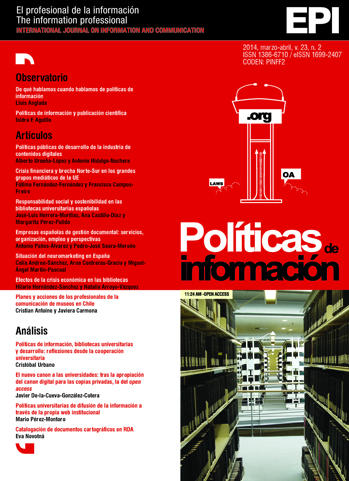Financial crisis and North-South gap within the main media groups in the EU
DOI:
https://doi.org/10.3145/epi.2014.mar.04Keywords:
Economic crisis, Financialization, Exchange quotation, Indebtedness, Concentration, Convergence.Abstract
The financial crisis and the economic adjustments within the most important media groups of the European Union (EU) have enlarged the North-South gap regarding financial strength, competitiveness and capitalisation, favouring Center European and UK patterns. The financial results of the 93 biggest media groups and enterprises in the EU provide evidence of not only the pernicious effects of financialization, but also the increase of regional divergences within the EU-28. The Mediterranean countries, which have got the worst results in all of the indicators analysed, are the most exposed to those dangers and confirm the poor advances of the media sector regarding convergence of management and economic solidity, at the expense of their capability to fulfil their social aims. The crisis has strengthened the position of the media groups in the North in front of the weakened South, that already had a greater dependence by its greater exposure to partisan interests. The daily circulation of press in the EU fell from 115.33 million copies distributed in 2008 to 82.54 in 2012, 27.73% less. 64.5% of the major media listed in the EU-28 is concentrated in five countries. 52.7% of the media has significant holdings in financial institutions.
Downloads
Downloads
Published
How to Cite
Issue
Section
License
Dissemination conditions of the articles once they are published
Authors can freely disseminate their articles on websites, social networks and repositories
However, the following conditions must be respected:
- Only the editorial version should be made public. Please do not publish preprints, postprints or proofs.
- Along with this copy, a specific mention of the publication in which the text has appeared must be included, also adding a clickable link to the URL: http://www.profesionaldelainformacion.com
- Only the final editorial version should be made public. Please do not publish preprints, postprints or proofs.
- Along with that copy, a specific mention of the publication in which the text has appeared must be included, also adding a clickable link to the URL: http://revista.profesionaldelainformacion.com
Profesional de la información journal offers the articles in open access with a Creative Commons BY license.




